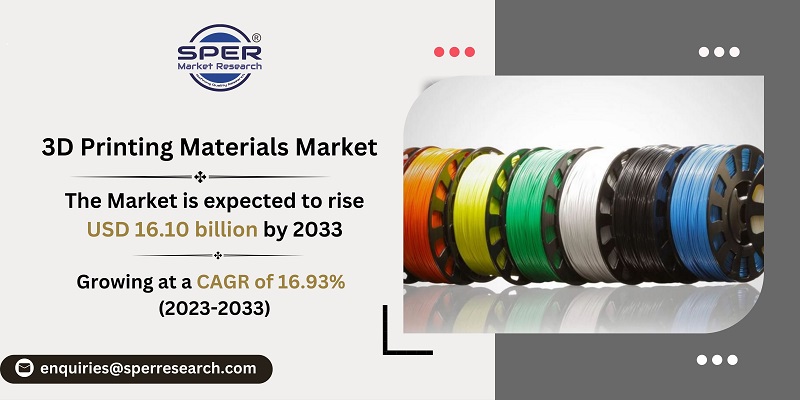
3D Printing Materials Market Growth, Size, Trends, Demand, Revenue, Challenges and Future Scope
3D Printing Materials Market Size- By Material Type, By Form, By End User Industry- Regional Outlook, Competitive Strategies and Segment Forecast to 2033
| Published: Feb-2020 | Report ID: CHEM2002 | Pages: 1 - 253 | Formats*: |
| Category : Chemical & Materials | |||
- September 2019: 3D Systems recently introduced two novel materials, PRO-BLK 10 and HI-TEMP 300-AMB, for 3D printing. These additions to their product lineup aim to broaden the company's offerings and provide customers with a wider array of options. The introduction of these materials will also expand the potential applications of 3D printing, offering greater versatility and utility to users.
- November 2018: Royal DSM N.V. has recently unveiled "Arnitel ID2060 HT," an advanced thermoplastic copolyester designed specifically for 3D printing through fused filament fabrication. This filament provides an optimal combination of characteristics, including excellent chemical resistance, flexibility, and the ability to withstand high temperatures. With its unique properties, the Arnitel ID2060 HT filament enables users to create durable and functional parts suitable for a wide range of applications in various industries.


| Report Metric | Details |
| Market size available for years | 2019-2033 |
| Base year considered | 2022 |
| Forecast period | 2023-2033 |
| Segments covered | By Material Type, By Form, By End User Industry |
| Regions covered | Asia Pacific, Europe, Middle East and Africa, North America, Latin America |
| Companies Covered | Arkema SA, Evonik Industries AG, General Electric, Hoganas AB, Materialise NV, Royal DSM N.V., Stratasys, Ltd., The ExOne Company, 3D Systems Corporation, Others |
- Architects and Construction Industry
- Education and Research Institutions
- Hobbyists and Makers
- Manufacturing and Industrial Sector
- Medical and Healthcare Sector
- Product Designers and Engineers
- Others
| By Product Type : |
|
| By Material : |
|
| By Packaging Type : |
|
| By Drug Delivery Mode : |
|
| By End User : |
|
- Global 3D Printing Materials Market Size (FY’2023-FY’2033)
- Overview of Global 3D Printing Materials Market
- Segmentation of Global 3D Printing Materials Market By Material Type (Ceramics, Metals, Plastics, Other Material Types)
- Segmentation of Global 3D Printing Materials Market By Form (Filament, Liquid, Powder)
- Segmentation of Global 3D Printing Materials Market By End User Industry (Aerospace, Automotive, Consumer, Electronics, Defense, Medical, Other)
- Statistical Snap of Global 3D Printing Materials Market
- Expansion Analysis of Global 3D Printing Materials Market
- Problems and Obstacles in Global 3D Printing Materials Market
- Competitive Landscape in the Global 3D Printing Materials Market
- Impact of COVID-19 and Demonetization on Global 3D Printing Materials Market
- Details on Current Investment in Global 3D Printing Materials Market
- Competitive Analysis of Global 3D Printing Materials Market
- Prominent Market Players in the Global 3D Printing Materials Market
- SWOT Analysis of Global 3D Printing Materials Market
- Global 3D Printing Materials Market Future Outlook and Projections (FY’2023-FY’2033)
- Recommendations from Analyst
1.1. Scope of the report1.2. Market segment analysis
2.1. Research data source2.1.1. Secondary Data2.1.2. Primary Data2.1.3. SPER’s internal database2.1.4. Premium insight from KOL’s2.2. Market size estimation2.2.1. Top-down and Bottom-up approach2.3. Data triangulation
4.1. Driver, Restraint, Opportunity and Challenges analysis4.1.1. Drivers4.1.2. Restraints4.1.3. Opportunities4.1.4. Challenges4.2. COVID-19 Impacts of the Global 3D Printing Materials Market
5.1. SWOT Analysis5.1.1. Strengths5.1.2. Weaknesses5.1.3. Opportunities5.1.4. Threats5.2. PESTEL Analysis5.2.1. Political Landscape5.2.2. Economic Landscape5.2.3. Social Landscape5.2.4. Technological Landscape5.2.5. Environmental Landscape5.2.6. Legal Landscape5.3. PORTER’s Five Forces5.3.1. Bargaining power of suppliers5.3.2. Bargaining power of buyers5.3.3. Threat of Substitute5.3.4. Threat of new entrant5.3.5. Competitive rivalry5.4. Heat Map Analysis
6.1. Global 3D Printing Materials Market Manufacturing Base Distribution, Sales Area, Product Type6.2. Mergers & Acquisitions, Partnerships, Product Launch, and Collaboration in Global 3D Printing Materials Market
7.1. Global 3D Printing Materials Market Value Share and Forecast, By Material Type, 2023-20337.2. Ceramics7.3. Metals7.4. Plastics7.5. Other Material Types
8.1. Global 3D Printing Materials Market Value Share and Forecast, By Form, 2023-20338.2. Filament8.3. Liquid8.4. Powder
9.1. Global 3D Printing Materials Market Value Share and Forecast, By End User Industry, 2023-20339.2. Aerospace9.3. Automotive9.4. Consumer Electronics9.5. Defense9.6. Medical9.7. Other
10.1. Global 3D Printing Materials Market Size and Market Share
11.1. Global 3D Printing Materials Market Size and Market Share By Material Type (2019-2026)11.2. Global 3D Printing Materials Market Size and Market Share By Material Type (2027-2033)
12.1. Global 3D Printing Materials Market Size and Market Share By Form (2019-2026)12.2. Global 3D Printing Materials Market Size and Market Share By Form (2027-2033)
13.1. Global 3D Printing Materials Market Size and Market Share By End User Industry (2019-2026)13.2. Global 3D Printing Materials Market Size and Market Share By End User Industry (2027-2033)
14.1. Global 3D Printing Materials Market Size and Market Share By Region (2019-2026)14.2. Global 3D Printing Materials Market Size and Market Share By Region (2027-2033)14.3. Asia-Pacific14.3.1. Australia14.3.2. China14.3.3. India14.3.4. Japan14.3.5. South Korea14.3.6. Rest of Asia-Pacific14.4. Europe14.4.1. France14.4.2. Germany14.4.3. Italy14.4.4. Spain14.4.5. United Kingdom14.4.6. Rest of Europe14.5. Middle East and Africa14.5.1. Kingdom of Saudi Arabia14.5.2. United Arab Emirates14.5.3. Rest of Middle East & Africa14.6. North America14.6.1. Canada14.6.2. Mexico14.6.3. United States14.7. Latin America14.7.1. Argentina14.7.2. Brazil14.7.3. Rest of Latin America
15.1. Arkema SA15.1.1. Company details15.1.2. Financial outlook15.1.3. Product summary15.1.4. Recent developments15.2. Evonik Industries AG15.2.1. Company details15.2.2. Financial outlook15.2.3. Product summary15.2.4. Recent developments15.3. General Electric15.3.1. Company details15.3.2. Financial outlook15.3.3. Product summary15.3.4. Recent developments15.4. Hoganas AB15.4.1. Company details15.4.2. Financial outlook15.4.3. Product summary15.4.4. Recent developments15.5. Materialise NV15.5.1. Company details15.5.2. Financial outlook15.5.3. Product summary15.5.4. Recent developments15.6. Royal DSM N.V.15.6.1. Company details15.6.2. Financial outlook15.6.3. Product summary15.6.4. Recent developments15.7. Stratasys, Ltd.15.7.1. Company details15.7.2. Financial outlook15.7.3. Product summary15.7.4. Recent developments15.8. The ExOne Company15.8.1. Company details15.8.2. Financial outlook15.8.3. Product summary15.8.4. Recent developments15.9. 3D Systems Corporation15.9.1. Company details15.9.2. Financial outlook15.9.3. Product summary15.9.4. Recent developments15.10. Others
SPER Market Research’s methodology uses great emphasis on primary research to ensure that the market intelligence insights are up to date, reliable and accurate. Primary interviews are done with players involved in each phase of a supply chain to analyze the market forecasting. The secondary research method is used to help you fully understand how the future markets and the spending patterns look likes.
The report is based on in-depth qualitative and quantitative analysis of the Product Market. The quantitative analysis involves the application of various projection and sampling techniques. The qualitative analysis involves primary interviews, surveys, and vendor briefings. The data gathered as a result of these processes are validated through experts opinion. Our research methodology entails an ideal mixture of primary and secondary initiatives.



Frequently Asked Questions About This Report
PLACE AN ORDER
Year End Discount
Sample Report
Pre-Purchase Inquiry
NEED CUSTOMIZATION?
Request CustomizationCALL OR EMAIL US
100% Secure Payment






Related Reports
Our Global Clients
Our data-driven insights have influenced the strategy of 200+ reputed companies across the globe.




















